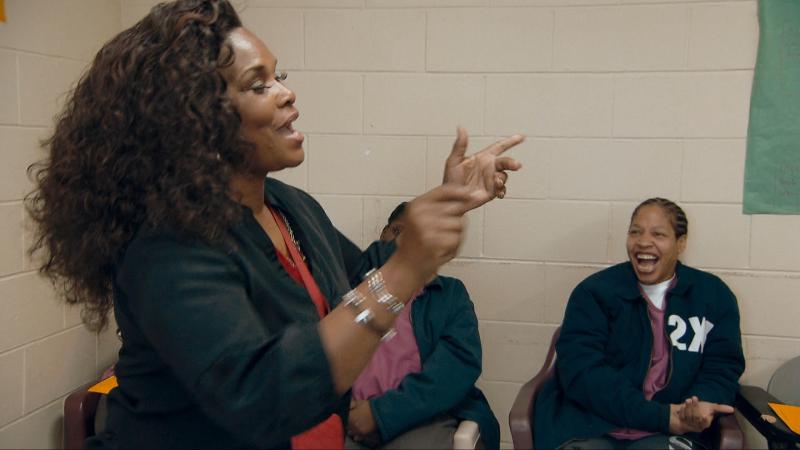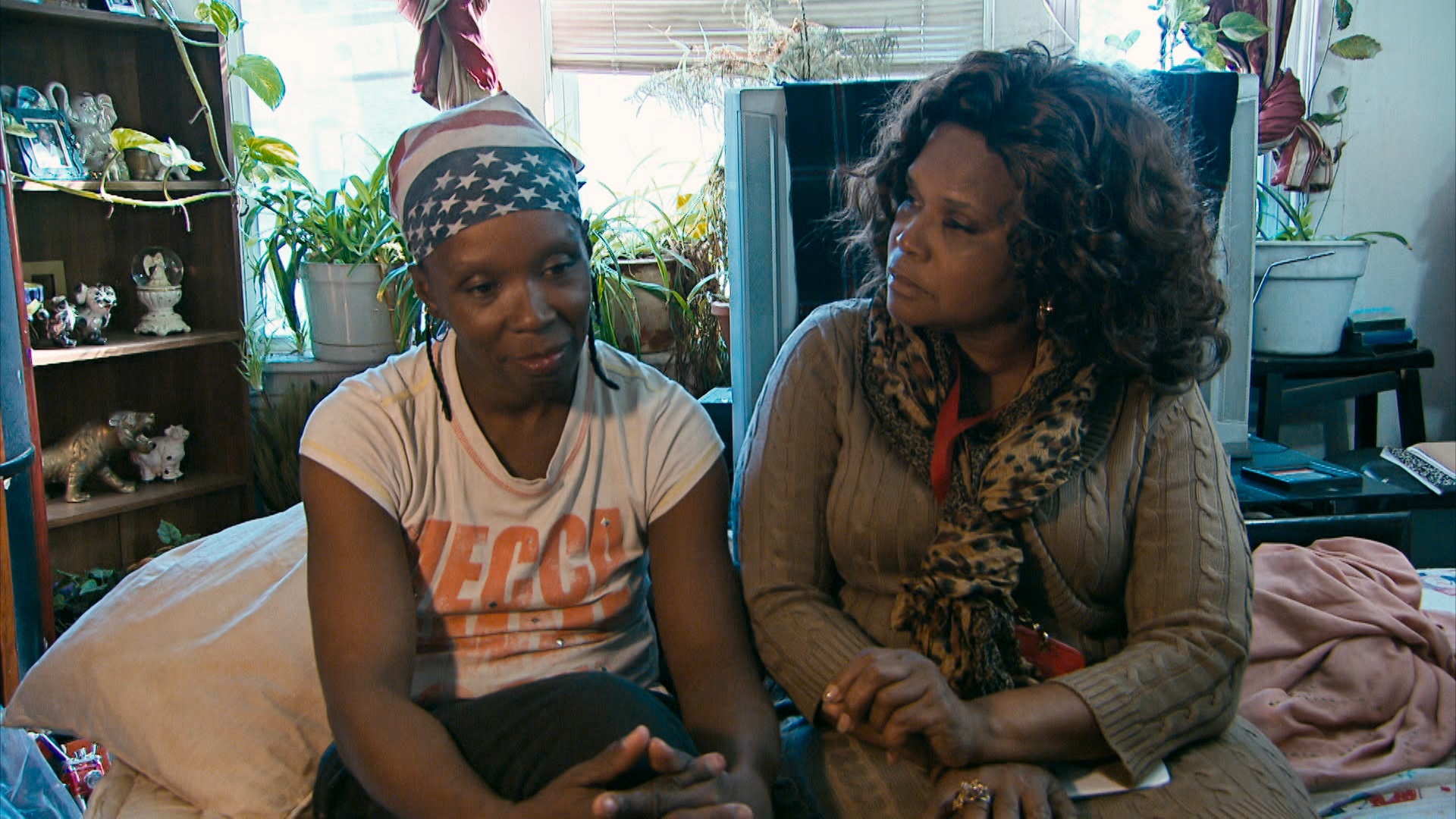Dreamcatcher | reviews, news & interviews
Dreamcatcher
Dreamcatcher
Kim Longinotto's latest is a lacerating documentary of Chicago's mean street lives

We get the big city views of Chicago, the bright lights and the skyscrapers, a few times in Kim Longinotto’s Dreamcatcher, but for the most part we’re planted firmly down at street level, in areas of town probably you wouldn’t want to go to, a fair amount of the time at night.
She’s come out the other side, and now she’s trying do something for those who remain trapped in the world she’s left behind. “You’re not a criminal, you’re a survivor!” is the salute Brenda offers to a group of prostitutes she meets on a prison visit after one of them has just recounted her own life story. Brenda’s message is that, even under the harshest circumstances – and some of the circumstances recounted in Longinotto’s film are as harsh as they get – there’s always a chance to turn a life around. It’s a message delivered with an empathy born out of experience – “Because I’m you!” – and without a hint of judgment. Help is there whenever the individual is ready, because it’s a decision that can only come from inside; the relapses, when they come, are never condemned.
The damages of early childhood are carried over into broken teenage years
For almost four decades British documentarist Kim Longinotto has been following women’s stories all over the world; her compendium documentary released earlier this year, Love Is All, an assemblage of British archive material which brought her back to the filmic landscapes of her native country, was a definite exception. Part of the remarkable immediacy of her work reflects the fact that she always works as her own cinematographer. Her more recent work has told stories from the developing world (after an early fascination with Japan), making Dreamcatcher’s American setting another turn away from the director's familiar territory.
We never learn how Longinotto first encountered Brenda and the rescue foundation that gives the film its title that she set up with a friend. But the degree of trust evident here is complete, less of a surprise with Brenda herself – who’s a presence whose empathy and energy is almost engulfing – but with some of the very damaged women who come into her orbit. Looking back over some of the director’s earlier films, like her remarkable Divorce Iranian Style (1998) or Sisters in Law (2005), those works seem somehow poised: by contrast, Dreamcatcher is as raw as it comes.
 It’s an accumulation of a few women’s stories, in which the damages of early childhood are carried over into broken teenage years. Even managing to stay in school at all is a major achievement when life forces you towards the streets. One of Longinotto’s most remarkable scenes shows Brenda visiting the local Paul Robeson High School to hold an after-school club with teenage girls. The frankness of their testimonies is as shocking as the almost neutral tone in which they’re told, as the girls relate their experiences of being raped (“recycled” being another word). It’s like a macabre countdown of the ages at which they were first violated: from 14, to 11, to nine, to eight, while one of them struggles to protect a four-year-old sister. And in almost every case, if they told anyone about what was happening they weren’t believed, left instead with a sense that it was their fault.
It’s an accumulation of a few women’s stories, in which the damages of early childhood are carried over into broken teenage years. Even managing to stay in school at all is a major achievement when life forces you towards the streets. One of Longinotto’s most remarkable scenes shows Brenda visiting the local Paul Robeson High School to hold an after-school club with teenage girls. The frankness of their testimonies is as shocking as the almost neutral tone in which they’re told, as the girls relate their experiences of being raped (“recycled” being another word). It’s like a macabre countdown of the ages at which they were first violated: from 14, to 11, to nine, to eight, while one of them struggles to protect a four-year-old sister. And in almost every case, if they told anyone about what was happening they weren’t believed, left instead with a sense that it was their fault.
Brenda herself is an inspirational figure: her ability to convey the message of choice and the possibility of a better future is conveyed with an almost preacher-like mantra, “Courage, strength, hope”. When caught “off-duty” she's very funny too, and Longinotto was let in to witness all. “I don’t know where my hair is,” was her voluble reaction to one moment of confusion: Brenda rotates between a variety of extravagant wigs.
Of these surrounding dysfunctional families and friends, Brenda’s own circle received no less attention. She’s on good terms with one of her former pimps, Homer, who comes along to address her meetings to tell his own story, allowing Brenda the rarely laconic remark, reversing their previous relationship, “Homer works for me”. Immediate family issues were as demanding as those found elsewhere, with Brenda's sister-in-law Melody a troubled presence, as a powerful later scene between the two showed (pictured, above): Brenda and her husband have adopted Melody’s young son.
Longinotto has made a lacerating film, and with her longtime editor Ollie Huddleston balances moments of urgent communication and witness with those when silences and faces speak more strongly. We don’t really learn where the Dreamcatcher Foundation gets its outside support from, but can only hope it’s a reliable source. Dreamcatcher immerses us in an ocean of pain, from which some do manage, somehow, to force their way to a shore of hope. How many more, we can't help wondering, are left drowning.
Overleaf: watch the trailer for Dreamcatcher
rating
Explore topics
Share this article
The future of Arts Journalism
You can stop theartsdesk.com closing!
We urgently need financing to survive. Our fundraising drive has thus far raised £49,000 but we need to reach £100,000 or we will be forced to close. Please contribute here: https://gofund.me/c3f6033d
And if you can forward this information to anyone who might assist, we’d be grateful.

Subscribe to theartsdesk.com
Thank you for continuing to read our work on theartsdesk.com. For unlimited access to every article in its entirety, including our archive of more than 15,000 pieces, we're asking for £5 per month or £40 per year. We feel it's a very good deal, and hope you do too.
To take a subscription now simply click here.
And if you're looking for that extra gift for a friend or family member, why not treat them to a theartsdesk.com gift subscription?
more Film
 theartsdesk Q&A: director Kelly Reichardt on 'The Mastermind' and reliving the 1970s
The independent filmmaker discusses her intimate heist movie
theartsdesk Q&A: director Kelly Reichardt on 'The Mastermind' and reliving the 1970s
The independent filmmaker discusses her intimate heist movie
 Blu-ray: Wendy and Lucy
Down-and-out in rural Oregon: Kelly Reichardt's third feature packs a huge punch
Blu-ray: Wendy and Lucy
Down-and-out in rural Oregon: Kelly Reichardt's third feature packs a huge punch
 The Mastermind review - another slim but nourishing slice of Americana from Kelly Reichardt
Josh O'Connor is perfect casting as a cocky middle-class American adrift in the 1970s
The Mastermind review - another slim but nourishing slice of Americana from Kelly Reichardt
Josh O'Connor is perfect casting as a cocky middle-class American adrift in the 1970s
 Springsteen: Deliver Me From Nowhere review - the story of the Boss who isn't boss of his own head
A brooding trip on the Bruce Springsteen highway of hard knocks
Springsteen: Deliver Me From Nowhere review - the story of the Boss who isn't boss of his own head
A brooding trip on the Bruce Springsteen highway of hard knocks
 The Perfect Neighbor, Netflix review - Florida found-footage documentary is a harrowing watch
Sundance winner chronicles a death that should have been prevented
The Perfect Neighbor, Netflix review - Florida found-footage documentary is a harrowing watch
Sundance winner chronicles a death that should have been prevented
 Blu-ray: Le Quai des Brumes
Love twinkles in the gloom of Marcel Carné’s fogbound French poetic realist classic
Blu-ray: Le Quai des Brumes
Love twinkles in the gloom of Marcel Carné’s fogbound French poetic realist classic
 Frankenstein review - the Prometheus of the charnel house
Guillermo del Toro is fitfully inspired, but often lost in long-held ambitions
Frankenstein review - the Prometheus of the charnel house
Guillermo del Toro is fitfully inspired, but often lost in long-held ambitions
 London Film Festival 2025 - a Korean masterclass in black comedy and a Camus classic effectively realised
New films from Park Chan-wook, Gianfranco Rosi, François Ozon, Ildikó Enyedi and more
London Film Festival 2025 - a Korean masterclass in black comedy and a Camus classic effectively realised
New films from Park Chan-wook, Gianfranco Rosi, François Ozon, Ildikó Enyedi and more
 After the Hunt review - muddled #MeToo provocation
Julia Roberts excels despite misfiring drama
After the Hunt review - muddled #MeToo provocation
Julia Roberts excels despite misfiring drama
 London Film Festival 2025 - Bradley Cooper channels John Bishop, the Boss goes to Nebraska, and a French pandemic
... not to mention Kristen Stewart's directing debut and a punchy prison drama
London Film Festival 2025 - Bradley Cooper channels John Bishop, the Boss goes to Nebraska, and a French pandemic
... not to mention Kristen Stewart's directing debut and a punchy prison drama
 Ballad of a Small Player review - Colin Farrell's all in as a gambler down on his luck
Conclave director Edward Berger swaps the Vatican for Asia's sin city
Ballad of a Small Player review - Colin Farrell's all in as a gambler down on his luck
Conclave director Edward Berger swaps the Vatican for Asia's sin city
 London Film Festival 2025 - from paranoia in Brazil and Iran, to light relief in New York and Tuscany
'Jay Kelly' disappoints, 'It Was Just an Accident' doesn't
London Film Festival 2025 - from paranoia in Brazil and Iran, to light relief in New York and Tuscany
'Jay Kelly' disappoints, 'It Was Just an Accident' doesn't

Add comment